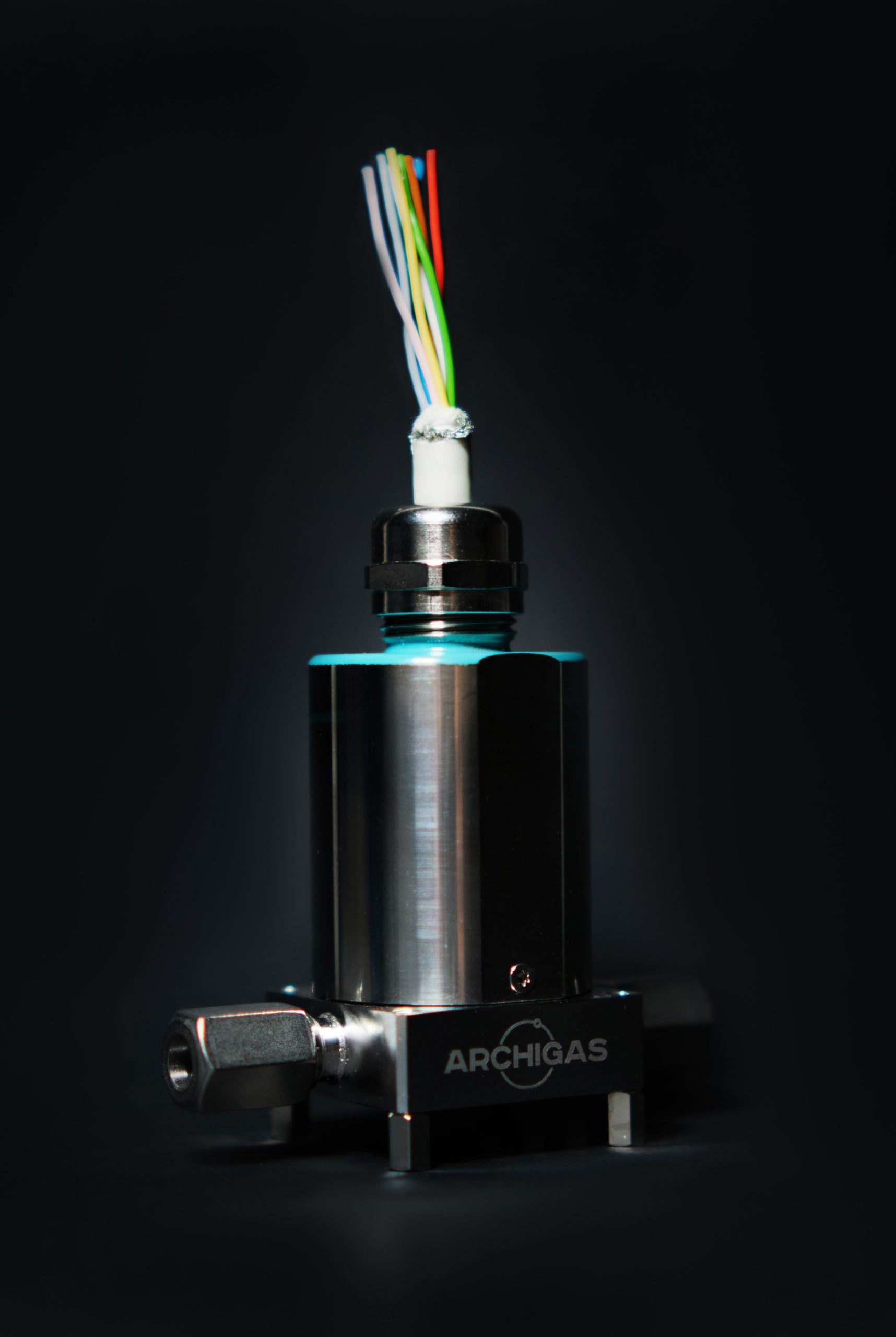
Tests prove high moisture resistance of Archigas hydrogen sensors.
Rüsselsheim am Main–– Dry realization: Only reliable gas analysis makes the production, storage and use of hydrogen as an energy carrier truly safe. So here, you literally must not break out in sweat, for example if the H2 sensor comes into contact with condensation water. After all, even small traces of moisture endanger the functionality of previous systems – the measurement stops abruptly, and it is not uncommon for the sensor technology itself to suffer irreparable damage. In short, moisture is a real “killer” of many gas analyzers. Accordingly, there is great interest among experts in a finding from the Archigas laboratory: tests confirm that the innovative sensor solution continues to reliably measure and transmit data even in a damp environment! Thus, the patented system of combined TCD and MEMS technology, which has already been highly praised by science and users for its various specifics, has another significant advantage.
Water can occur at various points in the H2 process chain. For example, there is already a lot of moisture in the system during the electrolysis process for production. One can also think of clogged filters in plants as well as fuel cell exhaust gases (water vapor) that generate condensate. Whatever the source, if liquid water comes into contact with sensors for gas analysis, this usually seals its abrupt end. This is not only associated with safety gaps, but often also with high costs – for example, due to operational downtime, repairs or the purchase of new modules with removal and installation. This can be counteracted by the innovative sensor technology from Archigas, which has been available on the market since spring 2023, as tests have shown: Its unique features not only ensure exceptional responsiveness, precision and stability of hydrogen measurement, as confirmed by scientists and users from all over the world, but also minimize or prevent adverse contact with condensation.
This is made possible by the special construction design of the small measuring module, which effectively counteracts any contact between condensate and the actual sensor technology. “We subjected the sensor to the ultimate endurance test in the renowned hydrogen laboratory of the RhineMain University of Applied Sciences (HSRM), with which we cooperate closely, and immersed it completely in a laboratory container filled with water. Even under these conditions, it continued to send data. We found only minor deviations, which were so minimal that they had no relevant impact on practical use,” sum up developers Illya Kaufman and Wladimir Barskyi.
“Of course, the sensor has not been developed for permanent use completely under water. After all, this does not correspond to its consistent purpose for H2 gas analysis in an industrial environment. Nevertheless, its high moisture resistance also has an enormous practical benefit. After all, interested parties who contact us repeatedly report their previous problems with wetness during hydrogen analysis. We have subsequently seen in pictures and on site the most adventurous constructions such as complicated heating and cooling systems to keep their previous measuring systems dry, often extremely difficult, space-consuming and cost-intensive. The consistent dehydration and complex sample preparation made the responsible persons symbolically break out in sweat”, so the two physicists and founders of Archigas. “So we are all the more pleased to be able to provide another argument for our unique measurement technology with its high moisture resistance.”
The central feature of the innovation, which has received a great deal of attention worldwide, is the combination of two technologies: Archigas, for example, has technically reimplemented the proven and precise thermal conductivity measurement principle (TCD sensors) and produces them using MEMS semiconductor technology, which in turn enables cost-effective mass production of identical products without the need for time-consuming calibration. On the basis of the developed sensors, the company offers gas measuring devices in various designs for, among other things, H2 generation by electrolysis, input quality control and testing of gas purity, as well as for controlling and monitoring gas mixtures. The uncomplicated handling of the devices, which are designed according to individual requirements, allows particularly simple integration of the TCD OEM modules into customer plants.
Further information is available by e-mail [email protected], by phone +49 (0)69 247 544 980 and at www.archigas.de.
About Archigas
Archigas is highly specialised in microsensor technology (MEMS) and gas analysis. Since its foundation in 2020, the company has developed sensor solutions, particularly in the fields of thermal conductivity, pressure measurement and flow measurement. Archigas’s stated aim is to offer customers cost-effective plug and play solutions that reliably fulfil highly complex analysis tasks. Since 2022 the company has also been funded by the state of Hesse as part of its LOEWE programme (‘State Offensive for the Development of Scientific and Economic Excellence’). This is to support work on the development of measuring devices suitable for the exploration of natural hydrogen and helium deposits. Despite international bids from the USA and elsewhere, Archigas GmbH decided to establish its headquarters in the Rhein-Main region, in order to help bolster the state of Hesse, and therefore Germany as a whole, as a location for business.
Archigas GmbH Eisenstraße 3
65428 Rüsselsheim am Main Germany
Tel.: +49 (0)69 24 75 44 980 E-Mail: [email protected]
Read the most up to date Fuel Cell and Hydrogen Industry news at FuelCellsWorks




